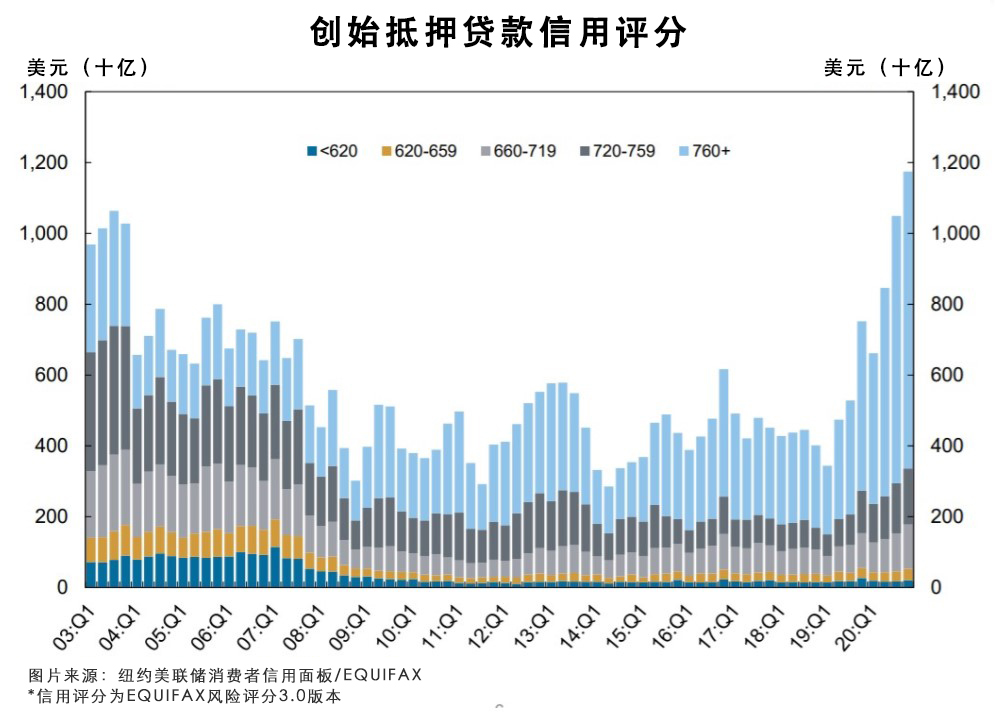美國的住宅房地產(chǎn)市場無疑正處于火爆狀態(tài),。根據(jù)最新報(bào)道,凱斯-席勒指數(shù)同比增長了11%,,而這僅僅只統(tǒng)計(jì)到了今年1月。我認(rèn)為,,在接下來的幾個(gè)月里,,這項(xiàng)數(shù)值還會(huì)變得更高。
關(guān)于住房短缺和荒謬的全現(xiàn)金交易,,我們都有所耳聞,。對(duì)眾多預(yù)測專家來說,種種跡象均顯示,,一場新的房地產(chǎn)泡沫似乎近在咫尺,。
但我不這么認(rèn)為。原因如下:
有信譽(yù)的借貸人
沒錯(cuò),房價(jià)正在快速上漲,,但目前的狀況與發(fā)生次貸危機(jī)時(shí)完全不同,。看看抵押貸款機(jī)構(gòu)的信用評(píng)分吧:
貸款大多都發(fā)放給了那些信用評(píng)分高,、首付金額大的人,,這與次貸房地產(chǎn)繁榮時(shí)的情況剛好相反。據(jù)《華爾街日?qǐng)?bào)》報(bào)道,,獲取抵押貸款的可能性已接近2014年以來的最低點(diǎn),。也就是說,銀行會(huì)收緊貸款,;出于對(duì)疫情影響財(cái)務(wù)狀況的擔(dān)憂,,居民們也會(huì)更加謹(jǐn)慎。不管怎樣,,如果最終選擇貸款的人數(shù)變多,,就可能會(huì)導(dǎo)致房地產(chǎn)市場的又一次膨脹。
住房供應(yīng)量
自上世紀(jì)90年代末以來,,市場上的現(xiàn)房供應(yīng)量一直處于歷史最低水平:
然而,,這并不一定是貪婪的購房大軍導(dǎo)致的結(jié)果。沒錯(cuò),,因?yàn)橐咔榈谋l(fā),,以及居家辦公幾率的提升,選擇搬遷的群體有所擴(kuò)大,。
市場上的住房數(shù)量也有所減少,,因?yàn)楫?dāng)一種通過空氣傳播的病毒在全球范圍內(nèi)蔓延時(shí),許多房主都不再敢讓陌生人到自家的房子里走動(dòng),。
上一次房地產(chǎn)繁榮和蕭條的后遺癥導(dǎo)致房屋建筑商減少了建房數(shù)量,。自2006年達(dá)到頂峰以來,建筑許可和房屋開工量分別下降了26%和37%,。
而自房地產(chǎn)泡沫破裂以來,,建筑許可和房屋開工量分別下降了30%和43%。從某些層面來說,,我并不會(huì)怪罪這些房屋建筑商,,但他們不愿多建的跡象表明,如今的狀況并不像2000年代中期那樣嚴(yán)重泡沫化,。
相對(duì)良好的資產(chǎn)負(fù)債表
與次貸危機(jī)時(shí)有所不同的另一點(diǎn)在于,,美國消費(fèi)者的財(cái)務(wù)狀況。
因?yàn)槔氏陆?、上次?jīng)濟(jì)危機(jī)后的恐慌以及經(jīng)濟(jì)刺激支出的健康增長,,與以往任何一次擺脫經(jīng)濟(jì)衰退時(shí)相比,,美國消費(fèi)者如今的狀況都還算不錯(cuò)。
房主把房產(chǎn)留在手里,,其資產(chǎn)凈值也大有增長,。截至2007年底,全美房產(chǎn)總凈值超過了10萬億美元,,但抵押貸款債務(wù)超過了9萬億美元,;而如今,房產(chǎn)總凈值超過了21萬億美元,,抵押貸款債務(wù)僅為10萬億美元,。
上一次深陷房地產(chǎn)泡沫時(shí),信用評(píng)分很差的人背負(fù)了太多的債務(wù),,根本無力償還,。這次的狀況則完全不同。
看看其他地方是否也存在泡沫
相比于美國,,另外一些國家更像是出現(xiàn)了房地產(chǎn)泡沫,。
本世紀(jì),加拿大和英國的房價(jià)輕而易舉地超過了美國,。自2000年以來,,英國房屋價(jià)格指數(shù)已上漲了200%以上。本世紀(jì),,加拿大的房價(jià)攀升了260%以上,。而針對(duì)美國的凱斯-席勒房屋價(jià)格指數(shù)僅上漲了139%。
可能你會(huì)說,,美國的房地產(chǎn)市場正處于泡沫之中,,其他地區(qū)的房地產(chǎn)則處于巨大的泡沫之中。不過,,如果你說的是多倫多和溫哥華,,還更有可能拿到我的贊同票。
房價(jià)上升得很合理
如今,,千禧一代是美國人口占比最多的群體,。其中,年齡最大的千禧一代今年就要滿40歲了,。相比于父母那一輩,,我們這群人買房的時(shí)間要晚得多,因?yàn)樯洗髮W(xué)的人更多,,受金融危機(jī)影響的程度更深,也可能是,,我們只是不想這么快就長大,。
和前幾代人一樣,,千禧一代也在慢慢長大。雖然在金融危機(jī)發(fā)生之后,,似乎有些不太可能,,但我們還是決定要安定下來,買套房子,。
在新冠疫情,、遠(yuǎn)程辦公、利率降低等因素的綜合作用下,,越來越多的人都選擇了買房,。
單純的價(jià)格上漲并不會(huì)自動(dòng)導(dǎo)致某個(gè)市場泡沫化。有些時(shí)候,,價(jià)格上漲也是有充分理由的,。你可能會(huì)不喜歡這些原因,但這和投機(jī)狂熱完全是兩碼事,。
這些因素會(huì)催生房地產(chǎn)泡沫嗎,?
當(dāng)然會(huì),永遠(yuǎn)不要低估美國人追求極端的欲望,。
但目前還沒有走到那一步,。(財(cái)富中文網(wǎng))
本·卡爾森Ritholtz Wealth Management的機(jī)構(gòu)資產(chǎn)管理總監(jiān)。他可能就擁有本文所討論的證券或資產(chǎn),。
譯者:殷圓圓
美國的住宅房地產(chǎn)市場無疑正處于火爆狀態(tài),。根據(jù)最新報(bào)道,凱斯-席勒指數(shù)同比增長了11%,,而這僅僅只統(tǒng)計(jì)到了今年1月,。我認(rèn)為,在接下來的幾個(gè)月里,,這項(xiàng)數(shù)值還會(huì)變得更高,。
關(guān)于住房短缺和荒謬的全現(xiàn)金交易,我們都有所耳聞,。對(duì)眾多預(yù)測專家來說,,種種跡象均顯示,一場新的房地產(chǎn)泡沫似乎近在咫尺,。
但我不這么認(rèn)為,。原因如下:
有信譽(yù)的借貸人
沒錯(cuò),房價(jià)正在快速上漲,,但目前的狀況與發(fā)生次貸危機(jī)時(shí)完全不同,。看看抵押貸款機(jī)構(gòu)的信用評(píng)分吧:

貸款大多都發(fā)放給了那些信用評(píng)分高,、首付金額大的人,,這與次貸房地產(chǎn)繁榮時(shí)的情況剛好相反,。據(jù)《華爾街日?qǐng)?bào)》報(bào)道,獲取抵押貸款的可能性已接近2014年以來的最低點(diǎn),。也就是說,,銀行會(huì)收緊貸款;出于對(duì)疫情影響財(cái)務(wù)狀況的擔(dān)憂,,居民們也會(huì)更加謹(jǐn)慎,。不管怎樣,如果最終選擇貸款的人數(shù)變多,,就可能會(huì)導(dǎo)致房地產(chǎn)市場的又一次膨脹,。
住房供應(yīng)量
自上世紀(jì)90年代末以來,市場上的現(xiàn)房供應(yīng)量一直處于歷史最低水平:
然而,,這并不一定是貪婪的購房大軍導(dǎo)致的結(jié)果,。沒錯(cuò),因?yàn)橐咔榈谋l(fā),,以及居家辦公幾率的提升,,選擇搬遷的群體有所擴(kuò)大。
市場上的住房數(shù)量也有所減少,,因?yàn)楫?dāng)一種通過空氣傳播的病毒在全球范圍內(nèi)蔓延時(shí),,許多房主都不再敢讓陌生人到自家的房子里走動(dòng)。
上一次房地產(chǎn)繁榮和蕭條的后遺癥導(dǎo)致房屋建筑商減少了建房數(shù)量,。自2006年達(dá)到頂峰以來,,建筑許可和房屋開工量分別下降了26%和37%。
而自房地產(chǎn)泡沫破裂以來,,建筑許可和房屋開工量分別下降了30%和43%,。從某些層面來說,我并不會(huì)怪罪這些房屋建筑商,,但他們不愿多建的跡象表明,,如今的狀況并不像2000年代中期那樣嚴(yán)重泡沫化。
相對(duì)良好的資產(chǎn)負(fù)債表
與次貸危機(jī)時(shí)有所不同的另一點(diǎn)在于,,美國消費(fèi)者的財(cái)務(wù)狀況,。
因?yàn)槔氏陆怠⑸洗谓?jīng)濟(jì)危機(jī)后的恐慌以及經(jīng)濟(jì)刺激支出的健康增長,,與以往任何一次擺脫經(jīng)濟(jì)衰退時(shí)相比,,美國消費(fèi)者如今的狀況都還算不錯(cuò)。
房主把房產(chǎn)留在手里,,其資產(chǎn)凈值也大有增長,。截至2007年底,全美房產(chǎn)總凈值超過了10萬億美元,,但抵押貸款債務(wù)超過了9萬億美元,;而如今,,房產(chǎn)總凈值超過了21萬億美元,抵押貸款債務(wù)僅為10萬億美元,。
上一次深陷房地產(chǎn)泡沫時(shí),信用評(píng)分很差的人背負(fù)了太多的債務(wù),,根本無力償還,。這次的狀況則完全不同。
看看其他地方是否也存在泡沫
相比于美國,,另外一些國家更像是出現(xiàn)了房地產(chǎn)泡沫,。
本世紀(jì),加拿大和英國的房價(jià)輕而易舉地超過了美國,。自2000年以來,,英國房屋價(jià)格指數(shù)已上漲了200%以上。本世紀(jì),,加拿大的房價(jià)攀升了260%以上,。而針對(duì)美國的凱斯-席勒房屋價(jià)格指數(shù)僅上漲了139%。
可能你會(huì)說,,美國的房地產(chǎn)市場正處于泡沫之中,,其他地區(qū)的房地產(chǎn)則處于巨大的泡沫之中。不過,,如果你說的是多倫多和溫哥華,,還更有可能拿到我的贊同票。
房價(jià)上升得很合理
如今,,千禧一代是美國人口占比最多的群體,。其中,年齡最大的千禧一代今年就要滿40歲了,。相比于父母那一輩,,我們這群人買房的時(shí)間要晚得多,因?yàn)樯洗髮W(xué)的人更多,,受金融危機(jī)影響的程度更深,,也可能是,我們只是不想這么快就長大,。
和前幾代人一樣,,千禧一代也在慢慢長大。雖然在金融危機(jī)發(fā)生之后,,似乎有些不太可能,,但我們還是決定要安定下來,買套房子,。
在新冠疫情,、遠(yuǎn)程辦公,、利率降低等因素的綜合作用下,越來越多的人都選擇了買房,。
單純的價(jià)格上漲并不會(huì)自動(dòng)導(dǎo)致某個(gè)市場泡沫化,。有些時(shí)候,價(jià)格上漲也是有充分理由的,。你可能會(huì)不喜歡這些原因,,但這和投機(jī)狂熱完全是兩碼事。
這些因素會(huì)催生房地產(chǎn)泡沫嗎,?
當(dāng)然會(huì),,永遠(yuǎn)不要低估美國人追求極端的欲望。
但目前還沒有走到那一步,。(財(cái)富中文網(wǎng))
本·卡爾森Ritholtz Wealth Management的機(jī)構(gòu)資產(chǎn)管理總監(jiān),。他可能就擁有本文所討論的證券或資產(chǎn)。
譯者:殷圓圓
There's no question residential real estate in the United States is on fire. The latest Case-Shiller Index data showed an 11% year-over-year increase. And this data is only through January. I would expect the numbers will be even higher in subsequent months.
We've all heard anecdotes of housing shortages and ridiculous all-cash offers. The logical conclusion for many prognosticators is to call this yet another housing bubble.
I don't think this is the case. Here are some reasons why:
Credit-worthy borrowers
Yes, housing prices are rising at a rapid clip but this is nothing like the subprime crisis. Just look at the credit scores for mortgage originations:
Loans are mostly being made to those with high credit scores and sizable down payments, the exact opposite of the subprime housing boom. According to the Wall Street Journal, mortgage credit availability is near its lowest point since 2014. This means the banks pulling back on lending or households pulling back because they have been worried about the effects of the pandemic on their finances. Either way, if more people eventually begin to take out loans this could actually lead to another leg higher in the housing market.
Housing supply
The supply of existing home sales on the market is as low as its ever been on record going back to the late-1990s:
Yet the reason for this isn’t necessarily a bunch of ravenous home-buyers. Yes, there has been an increase in people moving because of the pandemic and the work from home opportunities it has created.
There are also fewer homes on the market because so many homeowners felt uncomfortable having strangers walk through their house while an airborne virus is spreading around the globe.
And the hangover caused by the last housing boom and bust caused homebuilders to pull back on the number of homes they built. The number of building permits and housing starts are down 26% and 37%, respectively, since peaking in 2006.
Building permits and housing starts are off 30% and 43%, respectively since the housing bubble burst. In some ways I don’t blame these homebuilders but their reluctance to build is one of the signs things aren’t nearly as frothy as they were in the mid-2000s.
Better balance sheets
Another reason this is nothing like the subprime crisis is the state of the U.S. consumer’s finances.
A combination of falling rates, some trepidation following the last crash and a healthy dose of stimulus payments mean the U.S. consumer is in better shape than they’ve ever been coming out of a recession:
Homeowners themselves also have way more equity in their home. By the end of 2007 there was more than $10 trillion in home equity but more than $9 trillion in mortgage debt. Now there is more than $21 trillion in home equity and $10 trillion in mortgage debt.
During the last bubble people with terrible credit scores took on too much debt that they couldn’t possibly hope to repay. That’s not the case this time.
Look elsewhere for a bubble
If you want to call a housing bubble somewhere, there are much better options in other countries.
Prices in Canada and the UK have handily outpaced the United States this century. Since 2000, the UK House Price Index is up more than 200%. Housing prices in Canada are up over 260% this century. The Case-Shiller National Home Price Index for the United States is up 139%.
I suppose you could make the claim that U.S. housing prices are in a bubble while prices elsewhere are in a mega-bubble but you would have more sympathy from me as a bubble-caller if you’re talking about Toronto and Vancouver.
Prices are rising for the right reason
Millennials are now the biggest demographic in this country. The oldest millennial is turning 40 this year. My generation put off buying a house much longer than our parent’s generation because more of us went to college or the financial crisis or we just didn’t want to grow up as fast.
Like all previous generations, millennials got older. They decided to settle down and buy a home even though it seemed like that would never happen following the Great Financial Crisis.
And a combination of the pandemic, remote work and low interest rates have all pushed even more people to start buying houses.
Just because prices are rising does not automatically make something a bubble. Sometimes prices rise for good reasons. You may not like those reasons but that’s not the same thing as a speculative mania.
Could this turn into a bubble?
Sure, never underestimate the American desire to take things to excess.
But it’s not one right now.
Ben Carlson is the director of institutional asset management at Ritholtz Wealth Management. He may own securities or assets discussed in this piece.






